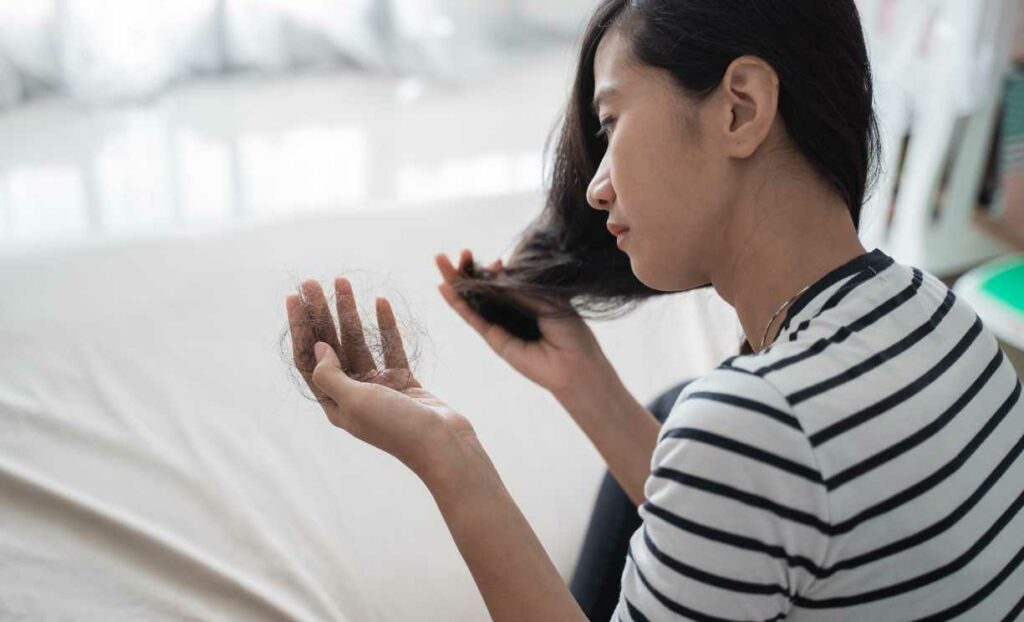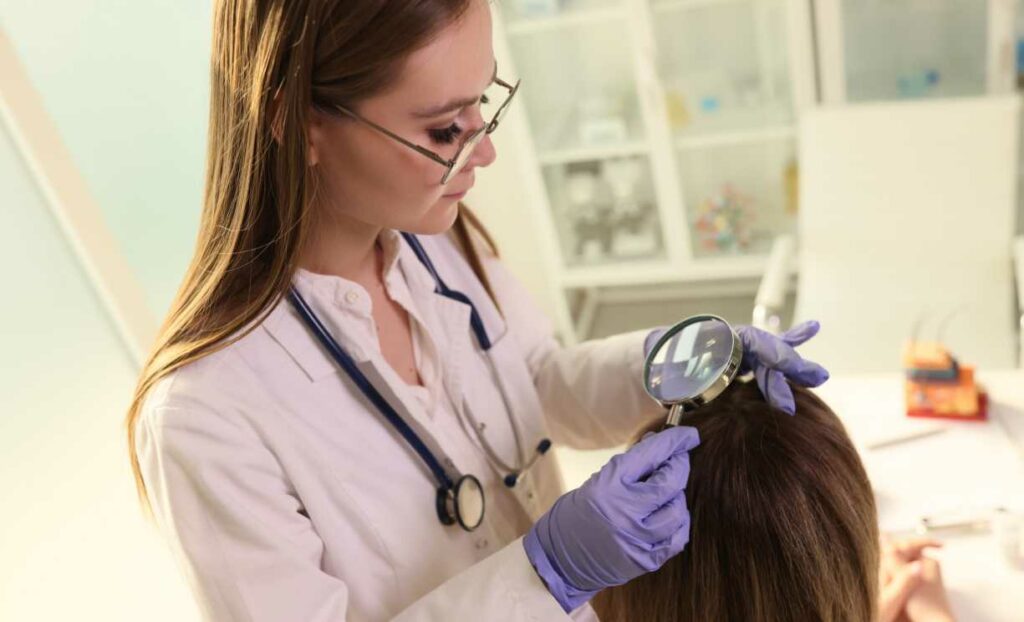Menopause, a natural phase marking the end of a woman’s reproductive years, brings about a multitude of changes, some more noticeable than others. One such transformative experience that often takes center stage is hair loss. While not everyone will experience it, the connection between menopause and hair loss is a reality for many women. In this blog, we’ll explore the factors behind this phenomenon, its emotional impact, and practical strategies to navigate the strands of change during this significant life transition.
Contents
Understanding The Link
Hair loss during menopause is primarily linked to hormonal fluctuations, particularly the decline in estrogen and progesterone. As women go through menopause, the levels of estrogen and progesterone, hormones vital for maintaining healthy hair, begin to decline. These hormones typically work together to support the hair growth cycle, but as their levels decrease, they can disrupt this cycle, leading to increased shedding and a visible reduction in hair volume.
Factors Contributing To Menopausal Hair Loss
Several factors contribute to menopausal hair loss, and understanding these elements is essential for addressing and managing this common concern:
- Hormonal Changes: The primary driver of menopausal hair loss is the significant hormonal fluctuations that occur during this life stage. The decrease in estrogen and progesterone, hormones that play a crucial role in supporting hair growth, can disrupt the natural hair growth cycle.
- Androgenetic Alopecia: Genetic factors can make women more susceptible to androgenetic alopecia, a hereditary condition that affects the hair follicles. Hormonal changes during menopause can exacerbate the effects of this condition, leading to increased hair shedding.
- Thyroid Dysfunction: Menopause can coincide with imbalances in thyroid function, particularly hypothyroidism. Thyroid hormones play a role in regulating metabolism, and disruptions in thyroid function can contribute to hair thinning and loss.
- Nutritional Deficiencies: Inadequate intake of essential nutrients can impact overall health, including hair health. During menopause, when hormonal changes are already affecting the hair, ensuring a balanced and nutrient-rich diet becomes crucial. Key nutrients for hair health include iron, vitamins D and E, and biotin.
- Stress: While stress doesn’t directly cause menopausal hair loss, it can contribute to the problem. Stress can exacerbate hormonal imbalances and trigger or worsen existing hair loss conditions.
- Medications: Some medications prescribed during menopause, such as hormone replacement therapy (HRT) or certain medications for other health conditions, can have side effects that include hair loss. It’s essential to discuss potential side effects with a healthcare provider.
- Autoimmune Conditions: Certain autoimmune conditions, such as alopecia areata, can lead to hair loss. These conditions involve the immune system mistakenly attacking hair follicles.
- Age-Related Changes: Aging itself can contribute to changes in hair texture and thickness. As women age, hair follicles may shrink and produce finer hair.
How To Manage Menopausal Hair Loss?
Navigating menopausal hair loss can be challenging, but adopting specific strategies can help manage and minimize its impact. Here are practical approaches to address menopausal hair loss:
- Consult with a Healthcare Professional: If experiencing significant hair loss, consult with a healthcare provider to identify potential underlying causes. They can conduct tests to check for hormonal imbalances, nutritional deficiencies, or other contributing factors.
- Maintain a Nutrient-Rich Diet: Ensure a balanced and nutrient-rich diet that includes essential vitamins and minerals for hair health. Incorporate foods rich in iron, vitamins D and E, biotin, and other nutrients. Supplements may be recommended if there are deficiencies.
- Scalp Massage and Stimulating Treatments: Stimulate blood flow to the scalp through gentle massage. Consider using topical treatments or shampoos containing ingredients like minoxidil, which may promote hair growth.
- Prescription Medications: In some cases, healthcare providers may prescribe medications to address hair loss. These may include minoxidil or other medications designed to promote hair growth. Discuss potential side effects and benefits with your provider.
- Hormone Replacement Therapy (HRT): Hormone replacement therapy, which involves restoring estrogen levels, may be considered for managing menopausal symptoms, including hair loss. However, the decision to pursue HRT should be made in consultation with a healthcare professional, considering individual health risks and benefits.
- Counseling and Support Groups: Hair loss during menopause can have emotional implications. Seek support from friends, and family, or join support groups where you can share experiences and coping strategies. Professional counseling can also be beneficial.
- Regular Exercise: Engage in regular physical activity, as exercise contributes to overall well-being, helps manage stress, and promotes a healthy scalp environment.
- Adequate Hydration: Stay well-hydrated to support overall health, including the health of your hair and scalp.
When To See A Health Care Professional?
If you’re noticing significant hair loss during menopause and it’s causing concern or impacting your confidence, it’s time to see a healthcare professional. Seeking advice when hair loss becomes more than the usual shedding is crucial. A healthcare provider can conduct tests to check for hormonal imbalances, nutritional deficiencies, or other underlying causes contributing to hair loss. They can provide personalized guidance, recommend treatments, and address any concerns you may have.
Whether it’s consulting with a general practitioner, a dermatologist, or a healthcare professional specializing in women’s health, their expertise can help determine the best course of action to manage and navigate menopausal hair loss effectively. Don’t hesitate to reach out if you’re unsure – your healthcare team is there to support you.
Conclusion
In conclusion, navigating the connection between menopause and hair loss is a journey that requires understanding, patience, and proactive care. As we transition through this natural phase of life, it’s essential to recognize that changes in hormonal balance can impact various aspects of our well-being, including the health of our hair.
In conclusion, navigating the connection between menopause and hair loss is a journey that requires understanding, patience, and proactive care. As we transition through this natural phase of life, it’s essential to recognize that changes in hormonal balance can impact various aspects of our well-being, including the health of our hair.
If you are facing menopause related issues, menopause treatment at HerMantra can help. Book your free trial online menopause treatment session now.





Very interesting details you have observed, regards for posting. “The surest way to get rid of a bore is to lend money to him.” by Paul Louis Courier.
Very interesting points you have mentioned, regards for posting.Money from blog